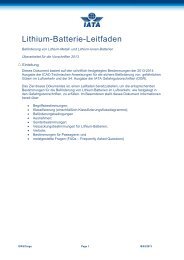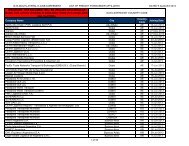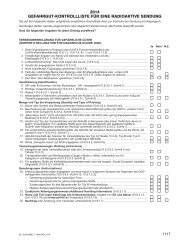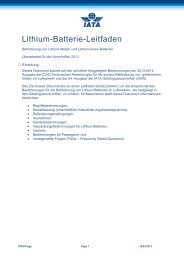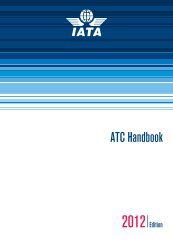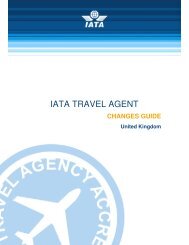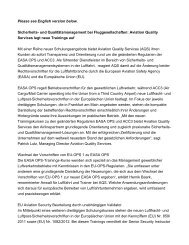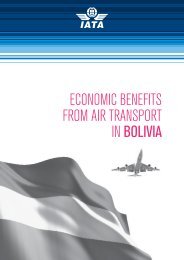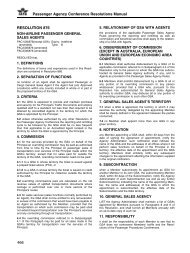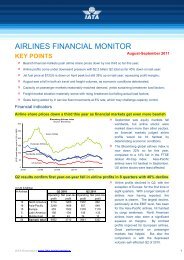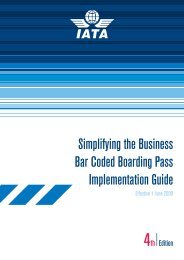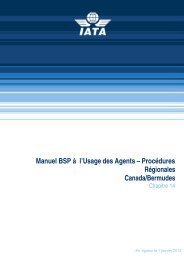Create successful ePaper yourself
Turn your PDF publications into a flip-book with our unique Google optimized e-Paper software.
In the face of such strong headwinds,<br />
keeping revenues ahead<br />
of costs is a major challenge.<br />
We still expect airlines to make<br />
a collective profit in <strong>2012</strong>. But<br />
it will be razor thin. Conserving<br />
cash, carefully matching capacity<br />
with demand, and managing<br />
costs will remain the focus for<br />
most airline managements.<br />
Behind the scenes, <strong>IATA</strong> has<br />
redoubled its efforts to manage<br />
the industry’s settlement<br />
processes reliably. Fully $367<br />
billion passed through <strong>IATA</strong>’s<br />
financial systems in 2011. The<br />
Billing and Settlement Plan—<br />
the largest among <strong>IATA</strong>’s financial<br />
services—settled nearly<br />
$250 billion in volumes with<br />
99.971% accuracy. We are<br />
determined to do even better.<br />
<strong>IATA</strong> is strengthening its settlement<br />
systems. By migrating<br />
functions to regional hubs, we<br />
will operate to a single global<br />
standard on fully integrated IT<br />
systems. The migration will take<br />
place progressively until mid-<br />
2014. In a separate program,<br />
we are taking paper out of the<br />
processes for the $49.5 billion<br />
<strong>IATA</strong> Clearing House.<br />
Along with ensuring reliable<br />
financial services, <strong>IATA</strong> is<br />
working with its members on<br />
aviation’s most fundamental<br />
challenges—safety, security,<br />
and sustainability.<br />
The Director General’s message<br />
2011 was the safest year for<br />
civil aviation. There was one<br />
hull loss for every 2.7 million<br />
flights with Western-built jets—<br />
a 61% improvement on the<br />
performance a decade ago. The<br />
<strong>IATA</strong> Operational Safety Audit<br />
(IOSA) is making a difference.<br />
Airlines on the IOSA registry—some<br />
375—outperformed<br />
the accident rate for non-IOSA<br />
operators by 52%.<br />
Together with the International<br />
Civil Aviation Organization<br />
(ICAO), the US Department<br />
of Transportation, and the<br />
European Union, we continue<br />
to build the Global Safety<br />
Information Exchange. This<br />
collection and sharing of data<br />
will enable analysis for targeted<br />
programs to make our safe<br />
industry even safer.<br />
Security processes must evolve<br />
to be risk-based and data<br />
driven. Our flagship security<br />
programs—Checkpoint of the<br />
Future and Secure Freight—are<br />
built around these principles.<br />
Support from governments is<br />
growing as they recognize the<br />
value of these initiatives.<br />
Aviation remains united in its<br />
global approach to managing<br />
its carbon emissions. Airlines,<br />
airports, air navigation service<br />
7<br />
providers, and manufacturers<br />
reiterated their commitment to<br />
improve fuel efficiency 1.5%<br />
annually to 2020, to achieve<br />
carbon-neutral growth from<br />
2020, and to cut net emissions<br />
in half by 2050 compared with<br />
2005 levels.<br />
Governments are important<br />
partners in meeting these<br />
targets. They must implement<br />
policy measures that de-risk<br />
investment in sustainable biofuels,<br />
unlocking their potential to<br />
reduce aviation’s carbon footprint<br />
up to 80%. And they must<br />
agree on a global approach to<br />
positive economic measures<br />
through ICAO. Progress is<br />
being held back by the global<br />
backlash against the extra-territorial<br />
inclusion of aviation in the<br />
EU Emissions Trading Scheme<br />
(ETS). ICAO offers a process<br />
to reach the global consensus<br />
that all parties—including<br />
Europe—desire.<br />
The ETS impasse highlights<br />
the urgent need to reaffirm our<br />
agenda with governments on<br />
jobs and growth. Many governments<br />
sacrifice the benefits of<br />
aviation-enabled connectivity<br />
for the shortsighted budget and<br />
political gains of high taxes,<br />
misguided regulations, and<br />
growth restrictions.<br />
Job creation is a priority of all<br />
governments. Aviation can help.<br />
Already our industry supports<br />
the livelihoods of 56.6 million<br />
people and $2.2 trillion in<br />
economic activity. And governments<br />
must understand that<br />
with an enabling policy environment<br />
we could do much more.<br />
When aviation gets stronger, so<br />
does the economy.<br />
I am passionate about aviation.<br />
As the Director General and<br />
CEO of <strong>IATA</strong> I have proudly<br />
sung aviation’s praises and<br />
advocated policies and partnerships<br />
that support its success.<br />
I thank the <strong>IATA</strong> Board of<br />
Governors and our members<br />
and partners for their great<br />
support in helping <strong>IATA</strong> help the<br />
industry.<br />
Aviation is indeed fragile. But<br />
by working together, I am confident<br />
that we can strengthen the<br />
foundations of our safe, secure,<br />
and sustainable industry.<br />
Tony Tyler<br />
Director General & CEO



